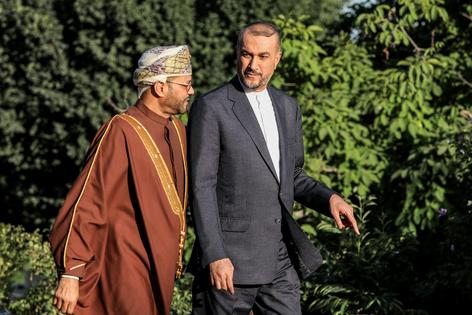Oman serves as a crucial back channel between Iran and the US as tensions flare in the Middle East
Published in Political News
Prior to launching a barrage of drones and missiles at Israel on April 13, 2024, Iran reportedly got word to Washington that its response to an earlier strike on its embassy compound in Syria would seek to avoid major escalation. The message was conveyed via the Gulf Arab state of Oman.
The current crisis in the Middle East is one that officials in Oman have spent years trying to avoid. Located across the Strait of Hormuz from Iran, and with close defense and security ties to the U.S. and the U.K., Oman is aware that tit-for-tat attacks raise the risk of a broader war that would engulf countries and armed nonstate groups across the region.
Full-blown war could be triggered by further escalatory actions by Tehran or Jerusalem. But it could also occur through miscalculation or misunderstanding, especially given the lack of official bilateral channels for dialogue and de-escalation.
And this is where Oman steps in. For years, the Gulf state has quietly built a track record of easing regional tensions through diplomacy. It has continued to play this role since the Oct. 7 attack by Hamas. In the months since that assault and Israel’s response in Gaza inflamed the region, Oman has held high-level dialogues with Iran, hosted British Foreign Secretary David Cameron for talks on security in the Red Sea, and called for a cease-fire in Gaza.
It could now play a crucial role in keeping a channel of communication open between the U.S. and Iran as parties seek to tamp down tensions.
Along with neighboring Qatar and Kuwait – as well as Switzerland, which represents U.S. interests in Iran in the absence of an American embassy – Oman has played a critical role in back-channel diplomacy.
But Oman’s approach is distinct from that of other nations. Rather than participating in direct talks, it creates space for dialogue, serving as a facilitator rather than a mediator.
Multiple reasons account for the Omani decision to act as a facilitator. Unlike several of the other Gulf states, such as Saudi Arabia and the United Arab Emirates, Oman lacks a history of tense relations with Iran.
Rather, Omanis recall that Iran under the shah provided support to Oman during the 1970s when the Gulf state’s then young new sultan, Qaboos bin Said, was fighting a decadelong uprising in the southern province of Dhofar.
Even after the shah was ousted in the 1979 Iranian revolution and replaced by a clerical regime headed by Ayatollah Khomeini, Oman stood apart from others in the region and declined to get involved in regional rivalries and competition for geopolitical influence that marred Iran’s ties with other Gulf states.
...continued








Comments